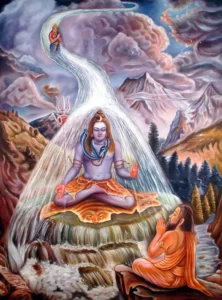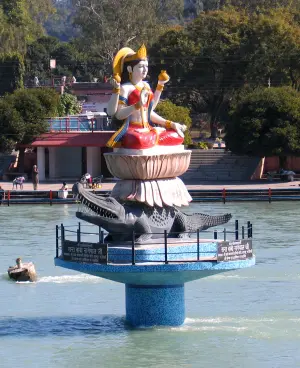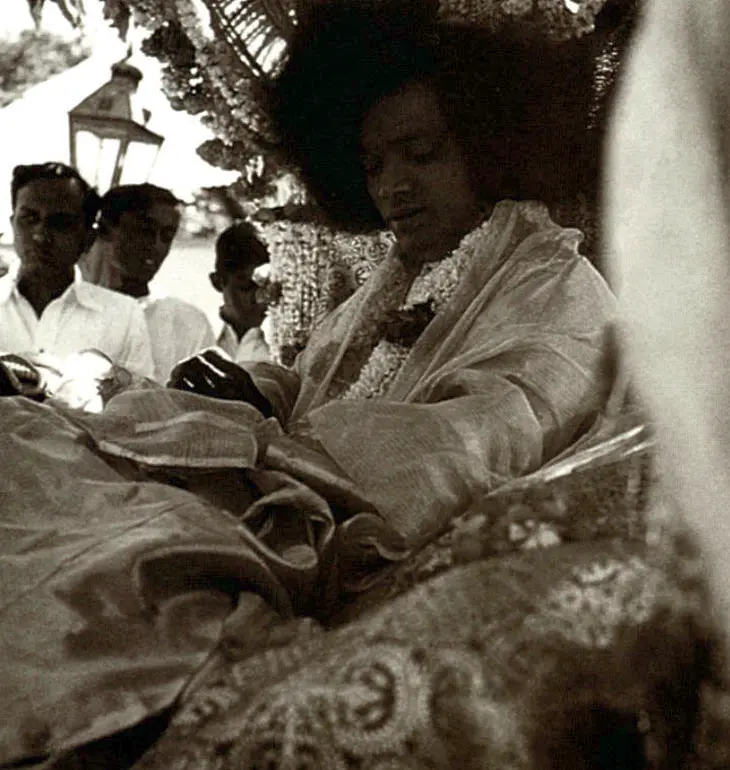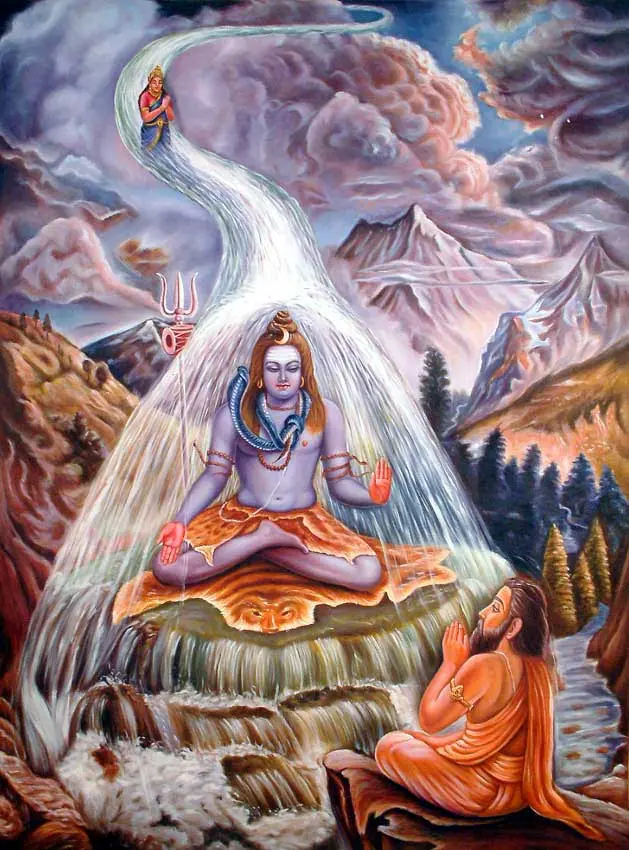 Ganga Saptami, the birthday of the Vedic goddess Sri Mata Ganga-ji, will be celebrated on Wednesday, April 26 in North and South America, and on Thursday April 27 in India and the rest of the world. This event is also called Ganga Jayanti. Every year, Sri Mata Ganga-ji is worshiped at noon on the seventh day of the waxing Moon (saptami tithi) in the Vaisakha month (which is the Vedic lunar month that extends from April 20 to May 20). Offerings and charity are also provided on this day.
Ganga Saptami, the birthday of the Vedic goddess Sri Mata Ganga-ji, will be celebrated on Wednesday, April 26 in North and South America, and on Thursday April 27 in India and the rest of the world. This event is also called Ganga Jayanti. Every year, Sri Mata Ganga-ji is worshiped at noon on the seventh day of the waxing Moon (saptami tithi) in the Vaisakha month (which is the Vedic lunar month that extends from April 20 to May 20). Offerings and charity are also provided on this day.
Origin of Ganges River
The Ganges River is formed by the confluence of River Bhagirathi and River Alaknanda at Devprayag in Uttrakhand. Before Devprayag the two rivers originate from different glaciers and travel southwards to meet at Devprayag. According to Hindu Mythology and Bhagavata Purana, the Ganges River used to flow in the universe (Brahmaloka). Several years later King Bhagiratha prayed to Lord Brahma to bring the Ganges River down to earth so that he may perform the ceremony for his ancestors who were cursed by sage. Lord Brahma fulfilled his wish but the flow of Ganges was so turbulent that it would have destroyed Earth. King Bhagiratha then prayed to Lord Shiva as only he was capable to hold the turbulent flow of Ganges. As the water started cascading down from heaven, Lord Shiva captured the Ganges water in his Jataa(tuft of hair) and then released it on Earth thereby reducing the destructive power of Ganges. Since it was the efforts of King Bhagiratha that the Ganges descended from heaven to earth, the Ganges River is also called the Bhagirathi River. Although Alaknanda River contributes more water at Devprayag, Bhagirathi is always considered as the main source of Ganges River.
Who is Ganga? She is one of the luminous forms of the divine creative energy of Shakti that streams from the Source of Everything.

Worship of Mother Ganga
Ganga was brought down on to earth by King Bhagiratha. He did this for the salvation of his ancestors who were turned into ashes by Sage Kapila. All the 60,000 ancestors of King Bhagiratha attained moksha. From that day onwards Ganga also came to be known as Moksha Dayini. The river is known as Mandakini in heaven; as Ganga on earth and as Bhogavati in the patala (netherworld of underworld).
In the Nadi Sutra in Rig Veda, Ganga is mentioned.
As per Vishnu Purana, Ganga originates from the feet of Vishnu – from the nail on the thumb of this left feet.
Earth could not take the fall of mighty Ganga, therefore she first flowed on to the matted locks of Shiva. Here she split into seven rivers –
- Nalini, Haldini and Pavani in northside.
- Sita, Chakushas and Sindhu in the westside
- Bhagirathi (Ganga) the seventh river flowed southeast.
Ganga is also believed to be the daughter of Himavan (king of mountains) and Maneka his spouse. This is because she has her origins in the Himalayas. As she is the daughter of Himavan, she is also the sister of Goddess Parvati. Kartik, son of Shiva, was born on Ganga River and therefore she is also one of the mothers of Kartikeya – Murugan or Skanda.
As per Puranas, Ganga travels on a crocodile (makara). She hold Kalash (symbol of water, life and fertility).
Those worshiping Ganga River on the Ganga Saptami day will have all their sins washed away. Those undertaking holy dip in the river on the day will attain moksha or salvation.
Mother Ganga Visits Puttaparthi
Baba soon returned to Puttaparthi from Bangalore. One day after bhajans, when the ladies began making garlands, Baba joined them. Suddenly He stood up, urging the others to follow Him. He said, “Come on! Come on! Mother Ganga is coming to visit us.” He went to the gates of the Mandir and opened them, extending His arms out on either side, while forbidding others from going beyond them. Pointing out in front He said that Ganga was coming. Those with Him saw a torrent of water coming forcibly towards them. They were very frightened and stood behind Baba. The waters came very near, but did not cross beyond Baba as He stood with arms outstretched. The whole scene was unearthly.
He asked devotees nearby to get coconuts, flowers, kumkum, turmeric and other articles of worship. By then, the waters almost surrounded Him. Things that stood on elevated land, like trees, were no longer visible. The surging water covered them all. With awe and fear the devotees offered worship to Mother Ganga. Baba, breaking coconuts and offering them into the river water, placed His Hands on the surface of the waters and said, “We are happy that you came to visit us. Now, go back, Ganga!” In response to His bidding, the water disappeared as suddenly as it had appeared. Everybody looked in disbelief to see that there was not even a drop of water anywhere and most amazingly, Baba’s robe was dry. He smiled and beckoned the devotees to look at His feet. There on the sand was a big garland of jasmine flowers lying at His feet. He picked it up, cut it open and distributed the flowers to everybody. These jasmine flowers were almost as large as roses, and their fragrance filled the place. (from Anyadha Saranam Nasthi)

Valmiki krutha Gangashtakam
(The octet to Ganga by sage Valmiki)
Translated by P.R.Ramachander
Swargarohana vaijayanthi, bhavatheem bhagiradhee prarthaye,
Thwatheere vasathasthwambhu pibathasthwadweecheeshupremgatha,
Sthwannamma smaratha sthwadarpitha drusa syanmey sareravyaya.
Mother goddess Bhagirathi,
Who is the co wife with Parvathi,
Who is the pretty garland to the earth,
Who is the climbing plant to ascend to heaven,
I have a prayer to you,
“I should live in your shores,
Drink your holy water,
Bathe in your holy waves,
Meditate on your holy names,
And die seeing you till the end.”
Thwathere tharu kotanthara gatho gange vihange varam,
Thwanere narakanthakarini varam mathsye adhava kachapa,
Naivanyathra madanda sindhuraghata sanghatta gandaranal,
Karathrastha samastha vairi vanitha labdha sthuthir bhoopathi.
It would be great to be born as a bird.
Living in any tree on your shores,
It would be great to be born as,
Fish or tortoise living in your waters,
Compared to be born as a king,
Praised by the wives of his enemies,
Who run away with fear hearing the loud sound of bells,
Tied round the ferocious crowd of elephants of his army.
Uksha pakshi thuraga uraga kopee vaa varano vaa,
Varinasyam janana marane klesa dukha sahishnu ,
Na thwanyathra praviralaranath kangana kwana mishram,
Varasthree bhi scha maramarutha veejithoo bhoomi pala.
Let me, who is tolerant to sorrow from birth and death,
Be born as a bull, bird, horse or elephant in the shores of Ganga,
Than being born as a king elsewhere whose servant maids,
Will fan him with hands making jingling sounds due to the bangles.
Kakair nishkushitham swabhi kabaliham gomayubhir lunditham,
Sthrothobhischalitham thatambhu lulitham veechibhir aandolitham,
Divya sthree kara charu chamara maruthsamveejyamana kadha,
Drakshyeham parameshwa tripadhage bhageeathi swam vapu.
Hey Parameshwari, Hey Ganga, When will I see myself.
Traveling in a heavenly aircraft, fanned by ladies from heaven and see,
My own body floating in the river Ganga, which is pecked by crows,
Being eaten by dogs, being dragged by small foxes,
Being shaken by the slow tides, being moved by water from the shores,
And it gets overturned by the tides of Ganga?
Abhinava bisavalli pada padmasyasys vishnor,
Madana madhana moularmalathi puspa mala,
Jayath jayapathaa kapyasou moksha lakshmya,
Kshapitha kali kalanga jahnavi na punathu.
Let the goddess who attains victory, as a ring in the lotus like feet of Vishnu,
As the flower garland which is the ornament of Shiva’s hair,
As the flag of victory of the Lakshmi who gives salvation,
And as goddess Ganga, remove the dirt of Kali yuga and save me.
Ethathala hamalasala saralavyolola valli latha,
Channam sooryakaraprathapa rahitham, sankhendu kundhojjwalam,
Gandharwamara siddha kinnaravadhoothungasthanasphaltham.,
Snanaya prathivasaram bhavathu may gangam jalam nirmalam.
Let me be able to take bath in the clear waters of Ganga,
Which is given shade by the creeping plants
Spread over palms, green trees and Sarala tree,
Which is as white as the conch , moon and jasmine flowers
And which is shaken by the bottom of the busts of ,
Maidens belonging to Gandharwa, deva, siddha and kinnara clans.
Gangam vaari manohari murari charanachyutham,
Tripurari siraschari papa hari punathu maam.
Let me be saved by the holy river Ganga,
Which is pretty and starts from the feet of Vishnu,
Which travels through the head of Lord Shiva,
And is an antidote for all the committed sins.
Paapahari durithari tharangadhari,
Shailaprachari giri raja guha vidhari,
Jjamkara kari har padambuja hari,
Gangam punathu sathatham shubhakari vaari.
Let me be protected again by the holy waters of Ganga
Which is the killer of all sins,
Which removes all bad deeds,
Which is full of tides,
Which flows from a mountain,
Which emanates from the caves of Himalayas,
Which flows with the torrential sound of “JJa”,
And which carries with it the dust of Vishnu’s feet.
Gangashtakam padathi ya prayatha prabhathe,
Valmeekina virachitham shubhadham manushya,
Prakshaalya gathra kali kalmasha pakamasu,
Moksham labeth pathathi naiva naro bhavabhdou.
He who reads with devotion this octet.
On Ganga written by sage Valmiki,
Daily in the morning without fail,
Would get rid of the dirt and sins of Kali,
And will never fall in the ocean of life.

![]()

